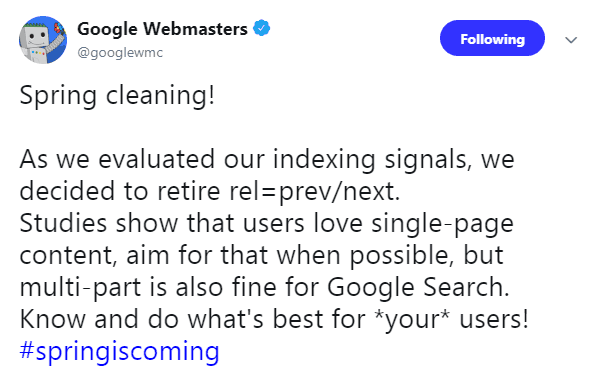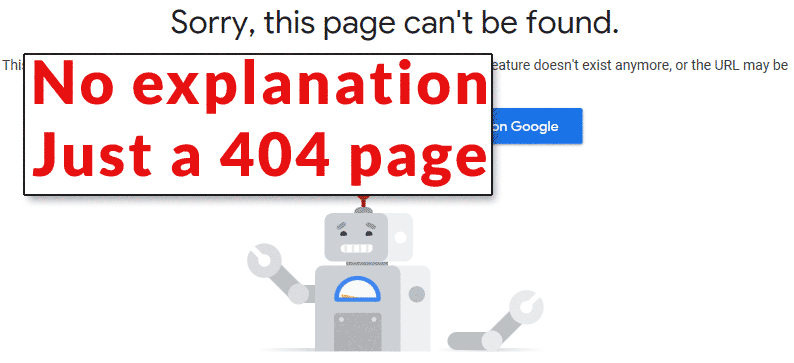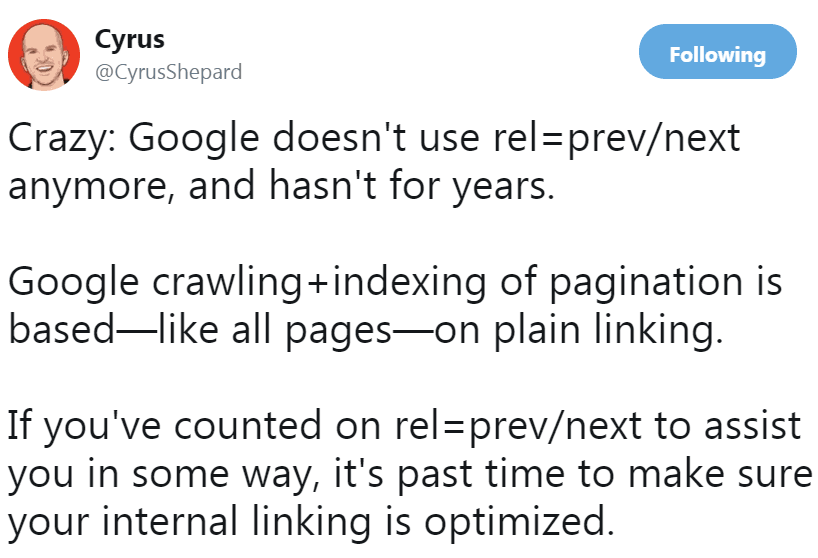Several years ago Google quietly stopped using the Rel=prev/next indexing signal. Google continued to encourage publishers to use the indexing signal. Years later Google tweeted an announcement that the indexing signal was no longer in use. The SEO and publishing community responded with disappointment and confusion.

What is the Rel=prev/next Indexing Signal?
Rel=prev/next was an indexing signal that Google advised publishers to use as a hint that a group of pages were part of a series of related pages. This allowed publishers to break up a document into several pages while still having the entire multi-page document considered as one document.
This was useful for long articles as well as for long forum discussions that can span to multiple pages.
Was it a Major Change?
From the perspective of web publishers it certainly felt like a major change. The indexing signal gave publishers the ability to help Google figure out complex site navigation.
Did Google Hope Nobody Would Notice?
There was no official announcement. Google simply issued a years late tweet.
Google removed the webmaster support page entirely and replaced it with a 404 response. No explanation.

Then Google updated the original blog post from 2011 to note that the guidance in the announcement was cancelled.

Publishers are Disappointed with Google
Under the leadership of Matt Cutts, Google endeavored to liaison with publishers to keep them updated on ways publishers could help improve their sites in a way that adhered to Google best practices.
This is why it came as a shock that Google had stopped using an important indexing signal and didn’t bother to tell publishers.
Google Encouraged Publishers to Use a Signal that Didn’t Work
As recently as January 2019, Google’s John Mueller was encouraging publishers to use the indexing signal, even though Google no longer used it.
In a Google Webmaster Hangout from January 2019, a publisher asked Google’s John Mueller about what he could to do force Google to show content from the first page of a paginated set of content instead of one of the inner pages.
John Mueller responded by affirming that Google tries to use the Rel=prev/next. He didn’t say that Google had already stopped using Rel=prev/next.
Mueller affirmed that Google was using it, even though Google had in fact been using it.
Here is John Mueller’s response:
“That’s something where we try to use rel next/previous to understand that this is a connected set of items.”
It may be that John Mueller did not know that it had been years since Google had used that indexing signal.
Many are Disappointed in Google
The SEO and publishing community responded in two ways. Some accepted the development quietly. But it seemed like most people were upset that Google had continued telling publishers to use something that Google had stopped responding to.
“Google stopped using rel=prev & next years ago, but forgot to tell the web. They claim users like single page. That’s like a librarian saying your book is somewhere in this unorganized library. Just look until you find it. “
Should You Take Down Existing Code?
Edward Lewis, a search marketer since 1995, noted that link prev-rel is a part of the HTML specification. So while Google may not be using them as a pagination hint, it is still a relevant HTML element and there is no need to take down existing code.
“Link Relationships (next, prev) have been in the HTML Specification long before Google finally read the instructions on how to use them.
So “Google Says” and now everybody is whining about the time they invested to setup their pages properly which should have been done to begin with. I wonder how many will now remove their link relationships just because “Google Says.”
Rel=prev/next Serves a Purpose
Others in the community noted that Rel=prev/next was an important tool for helping Google make sense of complex site architecture.
Alan Bleiweiss, a leading site audit specialist, observed that some sites are highly complex. He remarked that he did not trust Google to automatically be able to sort out the complexity.
He commented:
“This is insanity. …If I’ve got 50 paginated pages in a single sub-category, on a site with 10 categories, and a total of 10 sub-categories, there’s no way I can trust Google to “figure it all out”.
“Google is a mess of an organization. The lack of consistency, cohesiveness, and reinforcing signals within their own organization ends up being reflected by the lack of consistency, cohesiveness, and reinforcing signals site owners, managers and team members put out when doing the work on individual sites.”
The Pragmatic Response
Cyrus Shepard was non-judgmental. He tweeted a proactive and pragmatic course of action.

We who work online are pretty much living in Google’s world. Google is the hand that feeds many publishers.
Yet it is, as Danny Sullivan called it, an ecosystem. Google thrives when publishers thrive.





